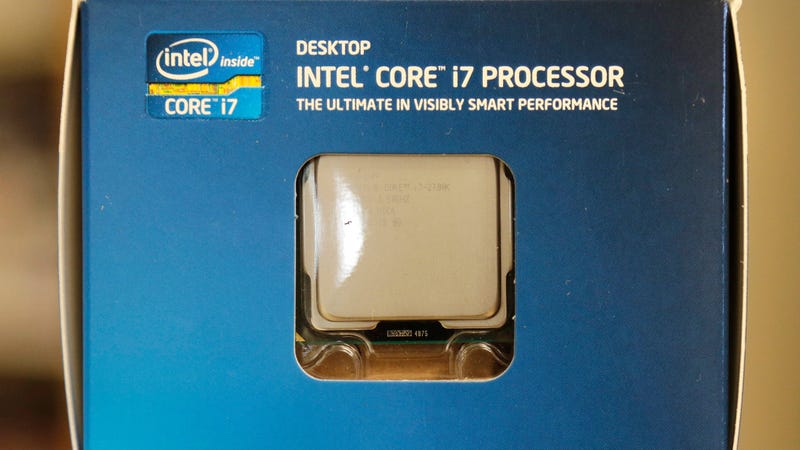- Joined
- Aug 7, 2008
- Messages
- 1,204
- Points
- 48
Newer & Newer very severe issues are showing up, one after another. And found out too late.
Should had use AMD and should seek alternative. Can China mass produce their own CPU core to sell? The one used by their world top supercomputer?
https://gizmodo.com/report-all-intel-processors-made-in-the-last-decade-mi-1821728240
Privacy and Security
Report: All Intel Processors Made in the Last Decade Might Have a Massive Security Flaw

Tom McKay
Today 12:00am
Filed to: Whoops
52.2K
565

Photo: AP
There’s small screwups and big screwups. Here is tremendously huge screwup: Virtually all Intel processors produced in the last decade have a major security hole that could allow “normal user programs—from database applications to JavaScript in web browsers—to discern to some extent the layout or contents of protected kernel memory areas,” the Register reported on Tuesday.
Recent Video from Gizmodo
View More >
Creatures That Stole Our Hearts in 2017
12/15/2017
Essentially, modern Intel processors have a design flaw that could allow malicious programs to read protected areas of a device’s kernel memory (memory dedicated to the most essential core components of an operating system and their interactions with system hardware). This flaw could potentially expose protected information like passwords. Since the error is baked into the Intel x86-64 hardware, it requires an OS-level overwrite to patch—on every major operating system, including Windows, Linux, and macOS.
The exact details of the design flaw and to what extent users are vulnerable are being kept under wraps for now, per the Register, though since developers appear to be rushing towards patching systems in coming weeks it is likely very bad. In the absolute worst-case speculative scenario, something as simple as JavaScript running on a webpage or cloud-hosted malware could gain access to some of the most sensitive inner workings of an Intel-based device.
Because the fix entails severing kernel memory entirely from user processes, patched OSes could potentially see a massive performance hit of “five to 30 percent slowdown, depending on the task and processor model”:
These KPTI [Kernel Page Table Isolation] patches move the kernel into a completely separate address space, so it’s not just invisible to a running process, it’s not even there at all. Really, this shouldn’t be needed, but clearly there is a flaw in Intel’s silicon that allows kernel access protections to be bypassed in some way.
The downside to this separation is that it is relatively expensive, time wise, to keep switching between two separate address spaces for every system call and for every interrupt from the hardware. These context switches do not happen instantly, and they force the processor to dump cached data and reload information from memory. This increases the kernel’s overhead, and slows down the computer.
Your Intel-powered machine will run slower as a result.
Five to 30 percent is a jaw-dropping number, but because of all the secrecy right now it’s difficult to tell how noticeable the impact will actually be for consumer use—enterprise-scale systems like cloud computing are likely to be the hardest hit. For the average user, it’s possible that the impact will be negligible. It’s also possible that a better implementation of the solution in future patches could reduce the performance hit.
“Urgent development of a software mitigation is being done in the open and recently landed in the Linux kernel” in redacted form, “and a similar mitigation began appearing in NT kernels in November,” the Python Sweetness blog wrote on Monday. “In the worst case the software fix causes huge slowdowns in typical workloads ... There are hints the attack impacts common virtualization environments including Amazon EC2 and Google Compute Engine.”
One problem with exploits is that even if this one is buried so deep it took ten years to find it, there’s no putting the cat back in the bag post-discovery. At the very least, the tiny slice of the market running AMD processors has some grounds to feel pleased about themselves.
[The Register/Hot Hardware]
More on hacking

Post-Equifax, Failure of US Lawmakers to Protect Data-Breach Victims is Glaring

Hackers Broke Into Forever 21's Payment System For Over Half of 2017

Study: Hackers Could Disrupt or Crash HDDs Using Only Sound Waves
Should had use AMD and should seek alternative. Can China mass produce their own CPU core to sell? The one used by their world top supercomputer?
https://gizmodo.com/report-all-intel-processors-made-in-the-last-decade-mi-1821728240
Privacy and Security
Report: All Intel Processors Made in the Last Decade Might Have a Massive Security Flaw

Tom McKay
Today 12:00am
Filed to: Whoops
52.2K
565

Photo: AP
There’s small screwups and big screwups. Here is tremendously huge screwup: Virtually all Intel processors produced in the last decade have a major security hole that could allow “normal user programs—from database applications to JavaScript in web browsers—to discern to some extent the layout or contents of protected kernel memory areas,” the Register reported on Tuesday.
Recent Video from Gizmodo
View More >
Creatures That Stole Our Hearts in 2017
12/15/2017
Essentially, modern Intel processors have a design flaw that could allow malicious programs to read protected areas of a device’s kernel memory (memory dedicated to the most essential core components of an operating system and their interactions with system hardware). This flaw could potentially expose protected information like passwords. Since the error is baked into the Intel x86-64 hardware, it requires an OS-level overwrite to patch—on every major operating system, including Windows, Linux, and macOS.
The exact details of the design flaw and to what extent users are vulnerable are being kept under wraps for now, per the Register, though since developers appear to be rushing towards patching systems in coming weeks it is likely very bad. In the absolute worst-case speculative scenario, something as simple as JavaScript running on a webpage or cloud-hosted malware could gain access to some of the most sensitive inner workings of an Intel-based device.
Because the fix entails severing kernel memory entirely from user processes, patched OSes could potentially see a massive performance hit of “five to 30 percent slowdown, depending on the task and processor model”:
These KPTI [Kernel Page Table Isolation] patches move the kernel into a completely separate address space, so it’s not just invisible to a running process, it’s not even there at all. Really, this shouldn’t be needed, but clearly there is a flaw in Intel’s silicon that allows kernel access protections to be bypassed in some way.
The downside to this separation is that it is relatively expensive, time wise, to keep switching between two separate address spaces for every system call and for every interrupt from the hardware. These context switches do not happen instantly, and they force the processor to dump cached data and reload information from memory. This increases the kernel’s overhead, and slows down the computer.
Your Intel-powered machine will run slower as a result.
Five to 30 percent is a jaw-dropping number, but because of all the secrecy right now it’s difficult to tell how noticeable the impact will actually be for consumer use—enterprise-scale systems like cloud computing are likely to be the hardest hit. For the average user, it’s possible that the impact will be negligible. It’s also possible that a better implementation of the solution in future patches could reduce the performance hit.
“Urgent development of a software mitigation is being done in the open and recently landed in the Linux kernel” in redacted form, “and a similar mitigation began appearing in NT kernels in November,” the Python Sweetness blog wrote on Monday. “In the worst case the software fix causes huge slowdowns in typical workloads ... There are hints the attack impacts common virtualization environments including Amazon EC2 and Google Compute Engine.”
One problem with exploits is that even if this one is buried so deep it took ten years to find it, there’s no putting the cat back in the bag post-discovery. At the very least, the tiny slice of the market running AMD processors has some grounds to feel pleased about themselves.
[The Register/Hot Hardware]
More on hacking

Post-Equifax, Failure of US Lawmakers to Protect Data-Breach Victims is Glaring

Hackers Broke Into Forever 21's Payment System For Over Half of 2017

Study: Hackers Could Disrupt or Crash HDDs Using Only Sound Waves


 Trump official claims North Korea to blame for WannaCry cyber attack
Trump official claims North Korea to blame for WannaCry cyber attack /cdn.vox-cdn.com/uploads/chorus_image/image/58206421/PB283235.0.jpg)

